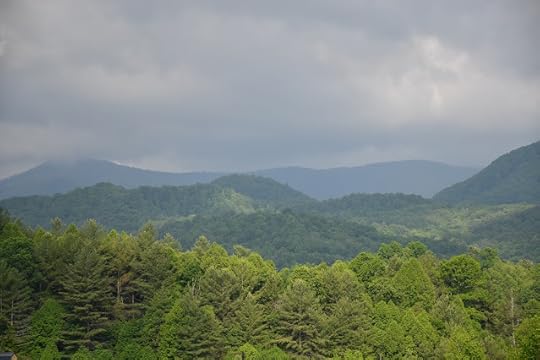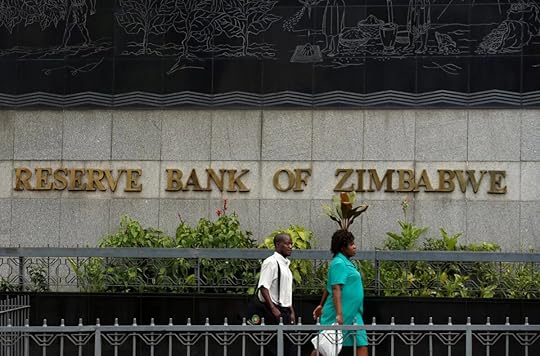Steve Bull's Blog, page 115
June 1, 2023
Feedback Loops and Unsustainable Systems
 Mountains as seen from Tennessee Welcome Center
Mountains as seen from Tennessee Welcome CenterI have brought up feedback loops (both positive and negative) many times in this space. I’ve also brought up unsustainable systems in one way or another in practically every article, since they are endemic in human society and at the root of every predicament. It would be very simple for me to tell you that if we just eliminated every unsustainable system and replaced them with sustainable ones that most all our troubles would be resolved. Aaahhh, if only it were that simple. While there is much truth to that statement, the physical realities of replacing these systems would be a massive transformation that is prevented by the Limits to Growth – not enough energy and resources to accomplish the job due to self-reinforcing positive feedback loops which would only add fuel to the fire of the existing ecological overshoot that we are already in. Understanding how we got to this point is key in comprehending why
options on dealing with overshoot are so limited. Several different ideas revolve around the same concept of creating a “new civilization” that humans could embark on to reduce overshoot and live happily ever after. I’ve pointed out one concept known as The Venus Project which is really nothing more than pure hopium. I’ve spent the last several articles detailing the Degrowth Movement and why degrowth in and of itself isn’t enough to actually accomplish much, mainly due to a lack of acceptance from corporations and governments, which would suffer greatly as a result. Of course, we’re all going to suffer from the implications of overshoot anyway, which makes that fact more or less irrelevant in the first place. I’ve pointed out why the MEER concept is unrealistic and more fantasy than reality…
…click on the above link to read the rest…
It will cost up to $21.5 billion to clean up California’s oil sites. The industry won’t make enough money to pay for it.
An expert used California regulators’ methodology to estimate the cost of cleaning up the state’s onshore oil and gas industry. The study found that cleanup costs will be triple the industry’s projected profits.
 An oil pumpjack is silhouetted against the morning sunrise on July 8, 2021, north of Bakersfield, California. George Rose/Getty Images
An oil pumpjack is silhouetted against the morning sunrise on July 8, 2021, north of Bakersfield, California. George Rose/Getty ImagesFor well over a century, the oil and gas industry has drilled holes across California in search of black gold and a lucrative payday. But with production falling steadily, the time has come to clean up many of the nearly quarter-million wells scattered from downtown Los Angeles to western Kern County and across the state.
The bill for that work, however, will vastly exceed all the industry’s future profits in the state, according to a first-of-its-kind study published on May 18 and shared with ProPublica.
“This major issue has sneaked up on us,” said Dwayne Purvis, a Texas-based petroleum reservoir engineer who analyzed profits and cleanup costs for the report. “Policymakers haven’t recognized it. Industry hasn’t recognized it, or, if they have, they haven’t talked about it and acted on it.”
The analysis, which was commissioned by Carbon Tracker Initiative, a financial think tank that studies how the transition away from fossil fuels impacts markets and the economy, used California regulators’ draft methodology for calculating the costs associated with plugging oil and gas wells and decommissioning them along with related infrastructure. The methodology was developed with feedback from the industry.
The report broke down the costs into several categories. Plugging wells, dismantling surface infrastructure and decontaminating polluted drill sites would cost at least $13.2 billion, based on publicly available data…
…click on the above link to read the rest…
The Super Rich Are Robbing Us All Blind
They do it all the time.
 Adobe Stock
Adobe StockGuess who’s the biggest welfare recipient in Mississippi state history. No, it’s not a single mom with three kids or a homeless drug addict.
It’s Brett Favre, an American football hero.
He’s worth $100 million.
Recently, a reporter named Anna Wolfe won the Pulitzer Prize for uncovering the largest federal embezzlement scandal to ever happen in Mississippi. It revolves around the legendary Favre, who pressured the state’s welfare office to spend $77 million on volleyball facilities for his daughter, a student at Southern Miss. When confronted, Favre went out of his way to portray himself as a clueless victim. As Sports Illustrated writes, Favre was “obsessed with not paying for it himself… He was relentless in his pursuit of government money.” He knew what he was doing. Favre didn’t stop with volleyball, either. He went on to press the governor for more money, via business grants and speaker fees. He even sent texts making sure the public didn’t know “where it came from.”
You’ll have fun reading the texts between Brett Favre and the state’s governor, Tate Reeves. It makes one thing painfully clear:
If you’re a star quarterback, you don’t have to work very hard to get powerful politicians to raise money for anything you want. When Favre asked for the volleyball stadium the governor replied, “We will have that thing built before you know it. One thing I know how to do is raise money.”
That’s interesting…
Mississippi routinely struggles to provide safe drinking water for its own citizens, many of whom live in extreme poverty. Last year residents in the state’s capital went months without drinking water at all. The problem loomed for years as the state continually refused to upgrade and maintain their water treatment facilities…
…click on the above link to read the rest…
Labor Leader’s Oil Plans Spark Outrage In Scotland
In January this year, at the Davos summit, the leader of Britain’s Labour party, Keir Starmer, said that if Labour won the next elections, they would put an end to investments in oil and gas in the North Sea.
This month, Starmer reiterated the promise—or threat, as Scotland saw it. The official announcement that a future Labour government will not approve any new oil and gas licenses for the North Sea is due to be made next month.
“What we’ve said about oil and gas is that there does need to be a transition,” Starmer said back in January, as quoted by Reuters.
“Obviously it will play its part during that transition but not new investment, not new fields up in the North Sea, because we need to go towards net zero, we need to ensure that renewable energy is where we go next.”
This month, a high-ranking labour official and shadow work and pensions secretary told Sky News that the move to wind and solar would create jobs and bring energy bills down—something that new oil and gas exploration in the North Sea will not do, according to Labour.
Yet Scotland begs to differ. Right after Starmer said Labour would ban new oil and gas exploration in the North Sea, former Scottish First Minister Alex Salmond dubbed Starmer the “North Sea job destroyer” and accused Labour of trying to sabotage Scotland’s energy security.
…click on the above link to read the rest…
ANALYSIS: Will Zimbabwe Pave the Way for Gold-Backed Money?
 People walk past the Reserve Bank of Zimbabwe building in Harare, Zimbabwe, on Feb. 25, 2019. (REUTERS/Philimon Bulawayo/File Photo)
People walk past the Reserve Bank of Zimbabwe building in Harare, Zimbabwe, on Feb. 25, 2019. (REUTERS/Philimon Bulawayo/File Photo)Will gold rescue Zimbabwe from the ashes of economic despair and usher in a new economic era?
Since Zimbabwe declared independence from the former Republic of Rhodesia in 1980, the southern African country has been ravaged by inflation and overall economic turmoil. Over the past 40 years, the annual inflation rate has only touched single-digit territory twice: 1980 (7 percent) and 1988 (7 percent).
Excessive money printing, fiscal mismanagement, economic sanctions, and currency instability have been the root causes of its perpetual financial crisis, resulting in political and social upheaval.
In 2008, Zimbabwe was given the unfortunate record of the highest inflation rate in the world, touching 250 million percent. This forced then-President Robert Mugabe and his government to abandon the Zimbabwe dollar and begin relying on nine foreign currencies, particularly the U.S. dollar and the South African rand. In 2019, Harare introduced a new Zimbabwean currency, but it did not take long for the revival of hyperinflation, with the inflation rate surpassing 600 percent by March 2020.
After numerous trials and errors on the monetary policy front, the Reserve Bank of Zimbabwe (RBZ) experimented with something old and something new: a gold-backed digital currency.
“Pursuant to the resolution of the Monetary Policy Committee (the MPC) on 28 March 2023 to complement the issuance of physical gold coins with gold-backed digital products, the Bank wishes to advise that it will be issuing gold-backed digital tokens with effect from 8 May 2023,” said RBZ Governor John Mangudya in a statement. “The gold-backed tokens will be fully backed by physical gold held by the Bank.”
Central bank officials say this money will be supported by 140 kilograms (4,900 ounces) of gold.
…click on the above link to read the rest…
May 31, 2023
Does Renewable Energy Have a Higher EROI Than Fossil Fuels?

There is new momentum behind the idea that renewable energy has a higher energy return on investment (EROI) than fossil fuels.
That contrasts with decades of consensus that the EROI of oil, for example, ranges from 18 to 35 while the range for solar is from 6 to 12.
Nafeez Ahmed wrote in a recent post that
“While the EROI values of wind and solar are “at or above 10”, the average EROI estimate for oil is about 4.2. Murphy et. al’s research concludes that many EROI analyses incorrectly compare fossil fuels with renewables by measuring them at the wrong areas. By consistently measuring them both at their ‘point of use’, they are able to develop a far more consistent approach.”
Similarly, Ugo Bardi wrote a post in January whose title was ” Setting the record straight on the EROI from renewables. It is much better than that of fossil fuels.”
Both Ahmed and Bardi used a 2022 paper, Energy Return on Investment of Major Energy Carriers: Review and Harmonization as their source.
Net Energy and EROI Essentials
Net energy is the difference between the total energy output minus the total energy input over the life cycle of an energy source or technology (Figure 1).
EROI is the ratio of the total energy output divided by the total energy input over the life cycle of an energy source.
That means that the net energy for a 10 megajoule (MJ) energy input and a 20 MJ output is 10 MJ and the EROI is 2 (Figure 1).
 Figure 1. Net energy and EROI for a hypothetical energy source or technology. Source: Modified from Hagens (2010).Table 1 shows a range of energy inputs and outputs and their corresponding EROI and net energy values. The important observation is that EROI is non-linear while net energy is linear.
Figure 1. Net energy and EROI for a hypothetical energy source or technology. Source: Modified from Hagens (2010).Table 1 shows a range of energy inputs and outputs and their corresponding EROI and net energy values. The important observation is that EROI is non-linear while net energy is linear.…click on the above link to read the rest…
War of the Worlds
 Photo by Benjamin Behre on Unsplash
Photo by Benjamin Behre on UnsplashIn parallel with – but perhaps not entirely unrelated to – the many technical aspects of the long decline of industrial civilization, my attention is increasingly captured by the massive global geopolitical shift precipitated by the war in Eastern Europe. I incline to believe that this battle is not a “mere” power struggle between supernational powers, but something which has its roots in ancient history, reaching back to the end of the Roman monarchy and the birth of the Roman Republic. It is no exaggeration to say the we live in ‘interesting’ times.
After a brief period of what looked like democracy — at least by squinting — we are seemingly left with only two forms of governance. We can either have “free market” capitalism ruled by rich oligarchs and unelected interest groups, or authoritarian regimes ruled by an oppressive strongman. There seems to be less and less ground in between the two… It’s like it’s 1984 again, with its two equally oppressive states: Oceania and Eurasia, with only the borders drawn somewhat differently.
In a certain sense, what we are witnessing these days is a war of these two worlds: an existential struggle between almighty capitalist oligarchies vs almighty centralized states. The mass formation psychosis euphemistically called “elections”, held in both types of entities, is nothing more than a weazen fig leaf hanging in front of a war machine of oppression and surveillance. Why, when was the last time you were offered a chance to vote which country to go to war against, or to go to war at all…?
But wait, haven’t we seen this time after time in history…? Well, surprise surprise, with the current geopolitical wrestle we’re seeing right now there is nothing new under the sun…
…click on the above link to read the rest…
May 28, 2023
State Farm Halts Home Insurance Sales In California
Faltering California took another economic hit on Friday, as America’s largest personal lines insurer said it would immediately stop selling new home insurance policies in the state. California is the largest property and casualty insurance market in the country.
State Farm attributed the decision to three factors: “historic increases in construction costs outpacing inflation, rapidly growing catastrophe exposure, and a challenging reinsurance market.” Reinsurance is a method of transferring some of an insurer’s risk to other insurers.
Existing policies will stay in effect — for now. There’s always the possibility that, if things keep deteriorating, State Farm could decide to “non-renew” current policy-holders. That’s what AIG did last year, sending thousands of high-end homeowners scrambling to find new coverage.
The announcement’s timing — on a Friday afternoon heading into a long holiday weekend — seemed intended to minimize publicity. In statement, State Farm said it “will cease accepting new applications including all business and personal lines property and casualty insurance, effective May 27, 2023. This decision does not impact personal auto insurance.” The halt seems to include renters insurance, though the announcement wasn’t explicit on that count.
Inflation has been taking a harsh toll on insurers, who are pressing regulators to approve rate hikes to compensate for rising claim costs. Earlier this month, for example, San Antonio-based USAA posted the first ever annual loss in its 100-year history — a $1.3 billion setback.
In California, insurers have also been contending with high wildfire risks, and many have curtailed coverage in wildfire-prone regions, or clamped down on homes that lack certain fire-thwarting characteristics, which range from building materials to clearing space between the structure and surrounding trees.
State Farm diplomatically acknowledged the California government’s efforts to make the state a viable place for property insurers to operate in, but implied their efforts to date have been insufficient:
…click on the above link to read the rest…
Doug Casey on the Death of Privacy… and What Comes Next

International Man: In practically every country, the allowable limit for cash withdrawals and transactions continues to be lowered.
Further, rampant currency debasement is lowering the real value of these ridiculous limits.
Why are governments so intent on phasing out cash? What is really behind this coordinated effort?
Doug Casey: Let me draw your attention to three truths that my friend Nick Giambruno has pointed out about money in bank accounts.
#1. The money isn’t really yours. You’re just another unsecured creditor if the bank goes bust.
#2. The money isn’t actually there. It’s been lent out to borrowers who are illiquid or insolvent.
#3. The money isn’t really money. It’s credit created out of thin air.
The point is that cash is freedom. And when the State limits the utility of cash—physical dollars that don’t leave an electronic trail—they are limiting your personal freedom to act and compromising your privacy. Governments are naturally opposed to personal freedom and personal privacy because those things limit their control, and governments are all about control.
International Man: Governments will probably mandate Central Bank Digital Currencies (CBDCs) as the “solution” when the next real or contrived crisis hits—which is likely not far off.
What’s your take? What are the implications for financial privacy?
Doug Casey: CBDCs are proposed as a solution, but in fact, they’re a gigantic problem.
Government is not your friend, and CBDCs are not a solution.
If they successfully implement CBDCs, it would mean that anything you buy or sell, and any income you earn, will go through CBDCs. You will have zero effective privacy. The Authorities will automatically know what you own, and they’ll be in a position to control your assets. Instantly.
…click on the above link to read the rest…
May 26, 2023
Ha Joon Chang’s ‘Shortest Economics Textbook Ever’
The 5 things they don’t tell you about economics…
Economics in brief from Ha Joon Chang
At the time of writing this textbook, he was Professor of Economics at Cambridge University, UK, now with SOAS University of London? Chang has created some great resources, I’ve linked to some more of his work, below this one page, 5 point economics textbook.
And here they are… 95% of economics is common sense
95% of economics is common senseYou don’t need a degree to understand it.
We’ve got this profession wrong; a lot of professional economists think what they do is too difficult for ordinary people. You’d be surprised how often these people are stupid enough to say things, at least in private, like ‘you wouldn’t understand what I do even if I explained it to you’. If you cannot explain it to other people, you have the problem.
People express strong opinions on all sorts of things despite not having the appropriate expertise: climate change, gay marriage, the iraq war, nuclear power stations. But when it comes to economic issues, many people are not even interested, not to speak of not having a strong opinion about them. When was the last time you had a debate on the future of the euro, inequality in china or the american manufacturing industry, despite the fact that these issues can have a huge impact on your life, wherever you live?
Economics is not a scienceDespite what the experts want you to believe, there is more than one way of ‘doing’ economics.
People have been led to believe that, like physics or chemistry, economics is a ‘science’, in which there is only one correct answer to everything; thus non-experts should simply accept the ‘professional consensus’ and stop thinking about it.
…click on the above link to read the rest…



